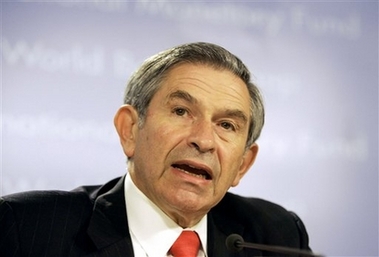SINGAPORE - Finance ministers on Monday backed a controversial new World Bank
strategy for tackling corruption in developing countries but insisted on
overseeing how it is implemented, officials said.

World Bank President
Paul Wolfowitz speaks during a joint news conference at the annual meeting
of the World Bank-IMF Monday, Sept. 18, 2006 in Singapore. The World
Bank's policy-planning panel on Monday said that its strategy to fight
corruption needs oversight of its executive board, in a move to ensure
that decisions to withhold aid are broad based.
[AP] |
World Bank President Paul Wolfowitz, backed by the United States, has been
determined to put anti-corruption at the heart of the bank's work, but big
European countries have voiced concern that his zeal could cause lending to poor
countries to slow.
After lengthy haggling behind the scenes, ministers meeting in Singapore
approved a revised plan and said their representatives on the bank's board would
oversee its implementation.
The agreement follows months of tension between Wolfowitz and member
governments over how best to position the bank to tackle corruption -- without
imposing itself as judge and jury.
An earlier draft would have put more power in the hands of the bank's
managers, who would have sent decisions to the board to be rubber-stamped.
Hilary Benn, Britain's development secretary, said he said he was very
pleased with the outcome. "It's clear that the board oversees its development,"
he said of the strategy.
Benn told reporters that he yielded to no one in his opposition to
corruption, but it was important to ensure a continuing flow of aid to alleviate
poverty.
"None of us should walk away from assisting poor people, even where the
situations are difficult," Benn earlier told the bank's main policy-steering
committee.
The issue of graft is a lightning rod for broader dissatisfaction with
Wolfowitz's management of the bank.
Last week Britain renewed a threat to withhold some money earmarked for World
Bank reforms to press the body to change the conditions it attaches to its
loans.
Wolfowitz's critics share his repugnance of corruption but say they were
concerned he was suspending loans to countries including Kenya, Bangladesh,
India and Cameroon in an arbitrary manner.
Speaking to the committee, Wolfowitz countered that good governance not only
ensured that funds were spent as intended but were vital to accelerating
economic growth and reducing poverty.
The bank had an obligation to see that its funds were used for the purposes
intended, he said.
"Those purposes are to provide good schools for poor children, to help poor
mothers get access to good health care and to give poor workers the chance for a
good job -- not to line the pockets and bank accounts of the corrupt and
powerful," he said.
But India's finance minister, Palaniappan Chidambaram, told ministers it was
wrong to hold aid hostage to the fight against corruption. "Development cannot
wait for improved governance and a corruption-free world. Both must go hand in
hand," he said.
Max Lawson, a policy adviser to the development agency Oxfam, said he was
pleased the bank's board would oversee the corruption fight and looked forward
to the strategy's being implemented in a way that puts poor people first.
"Corruption is too important to be politicized. It must be treated in a
transparent way so that countries know where they stand and there is proper
oversight," Lawson said.